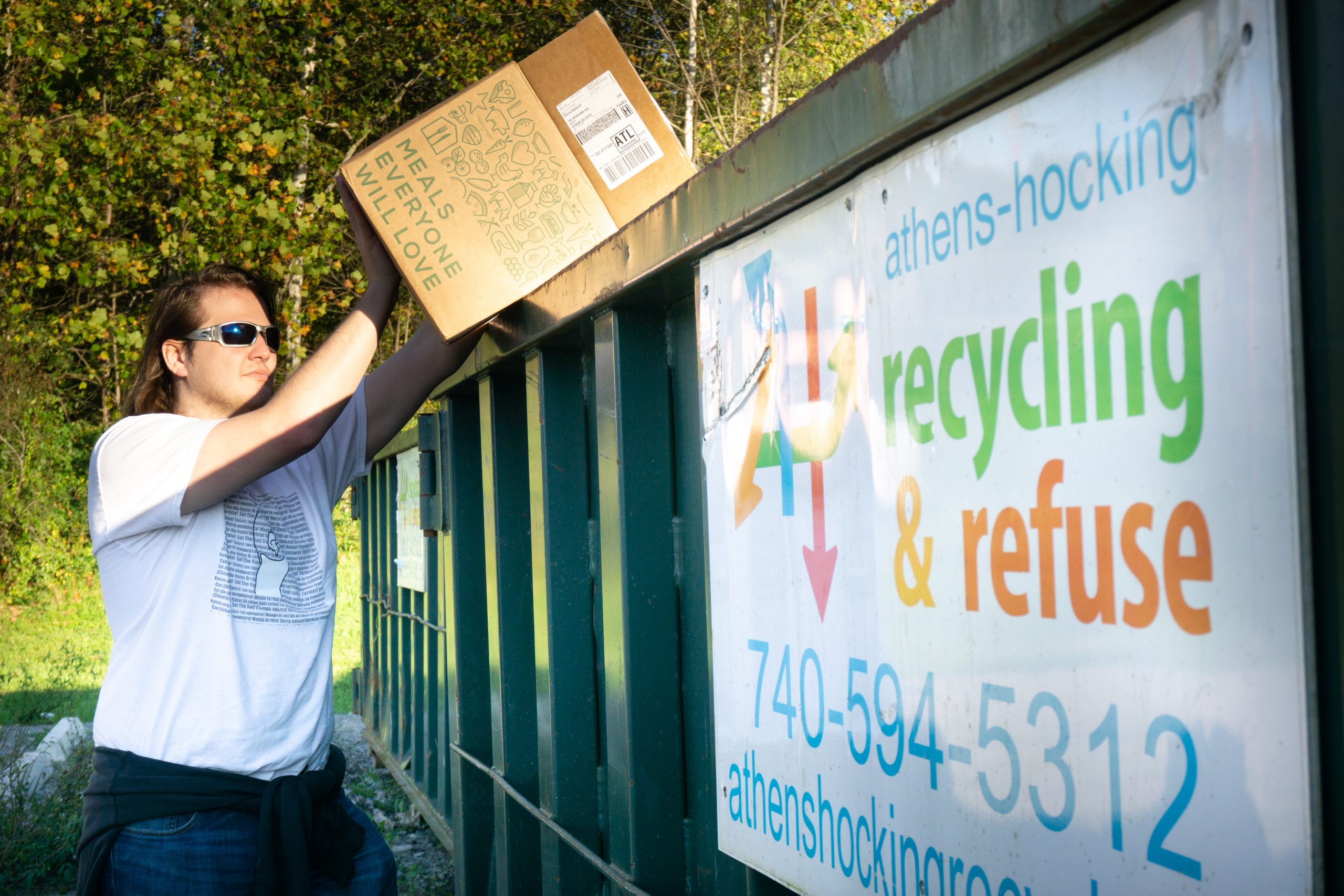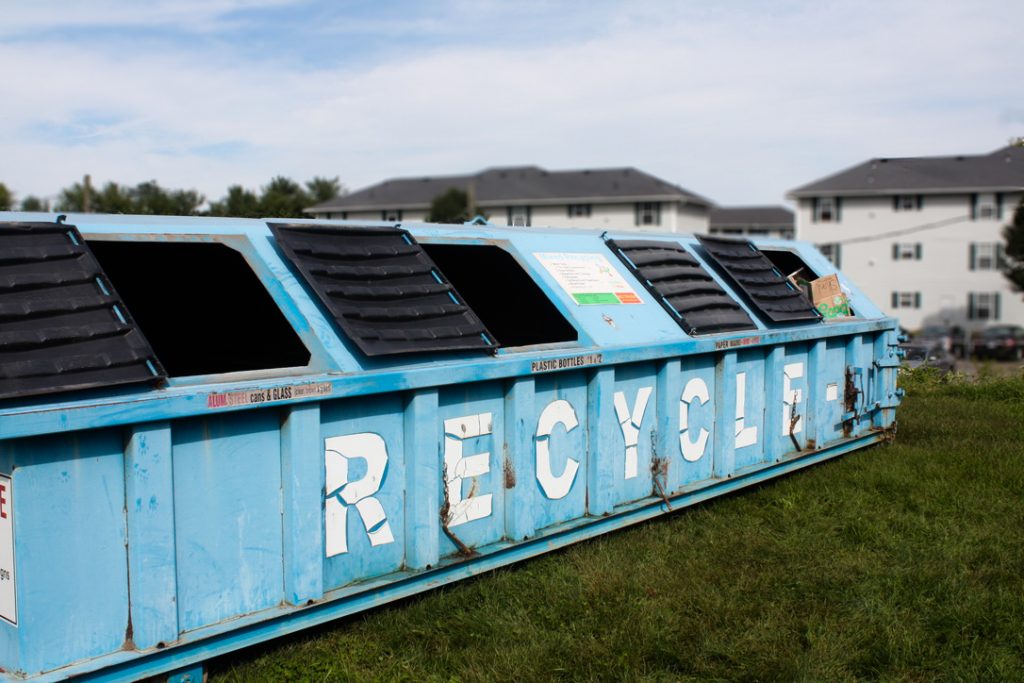
The conveyor belt work started around 3 p.m.
Rural Action volunteers set up numerous clearly-marked waste stations while supporters ate from food trucks, listened to bands, and watched skate demos at the Athens 2021 Skate Jam, an all-day benefit concert for the Athens Skate Park. As skaters lined up around the rim of the park, Shane Benton and Hannah Kopp sorted the accumulating waste to make sure everything went into the right bin. They worked for most of the day.
Their efforts are part of a wider movement throughout the region, where volunteers with AmeriCorps and Rural Action work to promote recycling and other waste-efficient initiatives. The Ohio Environmental Protection Agency issued a grant of over $600,000 this summer to numerous companies in Southeast Ohio to support these efforts.
Rural Action was one of the grant’s beneficiaries. Ed Newman, the Zero Waste director at Rural Action, says this focus is necessary, as waste has been mismanaged in the region for years.
“At one point, Ohio was the second largest importer of waste in the nation,” Newman says. “We were a sacrifice area for [the country’s] overconsumption.”
Newman has worked in waste management for over 20 years. He works with numerous organizations to reduce waste and create a healthier environment throughout Southeast Ohio.
The workload doesn’t bother him.
“I believe in the work, [that it] can turn in good things for our community, in terms [of] the environment, but also economically,” Newman says.
Newman says raising awareness for what people can do around Southeast Ohio is the best way to make a difference. One way Rural Action raises awareness is with events involving their Centers for Hard to Recycle Materials, or CHaRM days.
“What we wanted to do is establish an actual center for hard to recycle materials and then get these bits,” Newman says.

The company works to collect items like reusable batteries, mattress parts and medical materials. They then look to work with others who can best distribute those materials.
“Our job was to get that stuff compartmentalized and find somewhere we [can] take it,” Newman says. “We linked up… with an outfit that recycles that stuff and also gets close to people in need in their area.”
Other efforts include the waste stations at events around the region, such as at the Athens Skate Jam.
Hannah Kopp saw first-hand the kind of negative effects landfills can have when she visited one last year. Now, she hopes to spread awareness.
“They always say ‘it takes a village’ to do things, and I feel like that’s really important,” Kopp says. “When people learn about how to divert their waste, it really adds that collective knowledge on how we can like help to not only reduce waste into the landfill, but also reduce waste in general.”
Benton says that working at larger events has helped educate people on the benefits of recycling.
“[It’s] like the ‘Fajita effect,’ when someone walks by with a fajita and it’s sizzling and everyone looks like, ‘What is that?’ [It’s a] conversation-starter about what we’re doing,” Benton says.
And there’s no age limit for someone to start helping the environment.
Lori Simonton, the executive director of environmental health for the Vinton County Health Department, says they’ve placed a focus on raising awareness in school districts in multiple parts of Southeast Ohio.
The programs work with fourth graders to increase their knowledge of the potential harm that disregarding recycling can do.
“The health department has partnered with the Gallia, Jackson, Meigs and Vinton Solid Waste District to conduct fun, interactive presentations and games to teach students the importance of recycling and how reducing the amount of recyclable materials going into landfills can positively impact the environment,” Simonton says.
Reducing recyclable waste that is thrown away can help communities by reducing the amount of land needed for landfills.
But problems, like burning waste, still remain.
Simonton said her office is tasked with investigating those claims.
“It is definitely a public health nuisance and must be abated due [to] the negative effects on the environment and humans,” Simonton says.
Some of the environmental harms burning waste can cause are species loss, habitat loss, air pollution, water pollution and soil pollution, Newman says. Maybe the largest area people can focus their attention on is their food waste.
“One of the big areas that we’re trying to get happening is targeting organic waste. Food is, as it turns out, that’s a pretty big chunk of our waste,” Newman says.
Newman also says about a third of the 3,500 residences in Athens are actively composting, which is one of the main ways a community can help address waste.

But it’s not the only way. Newman says a large part of the grant they received from the Ohio EPA is going to machinery to help restaurants.
For restaurants to be able to properly compost, they typically need something to shred down the packaging food comes in, if it’s not reusable. That’s why Rural Action is investing in a shredder.
“We bought that piece of equipment so that we can be more accessible to commercial establishments like all those food establishments uptown, for instance,” Newman says.
Part of the grant will also create resources to be able to work larger events around the region.
“[At] these events where people were drinking beer, and they have all these food vendors, we’re able to turn those events in[to] the zero waste events while people are having a good time,” Newman says. “So it’s kind of an art to doing that.”
Benton says that after hours of work put in by the volunteers, the most rewarding part is being able to see how much their effort paid off.
“There’s a tangible thing, at the end of the day when you go through everything, and you weigh it and you get your data, there’s a tangible thing like ‘Woah, [We got] a quarter ton of stuff not going to the landfill now, not becoming carbon dioxide or methane.’”
Going forward, Benton says that putting resources into these efforts has many benefits for the community.
“Creating markets closer to home, circulating money closer to home, creating tax base, creating jobs in our area,” Benton says. “Instead of sending this stuff to the landfill and burying it and creating a toxic time bomb that we’re going to have to deal with down the road.”
Simonton had one message: Get involved now.
“Parents should start teaching their children at a young age how important it really is to reduce, reuse and recycle,” Simonton says. “These really are not three little words that just sound good together.”
“I believe in the work, [that it] can turn in good things for our community, in terms [of] the environment, but also economically,” Newman says
“Creating markets closer to home, circulating money closer to home, creating tax base, creating jobs in our area,” Benton says. “Instead of sending this stuff to the landfill and burying it and creating a toxic time bomb that we’re going to have to deal with down the road”